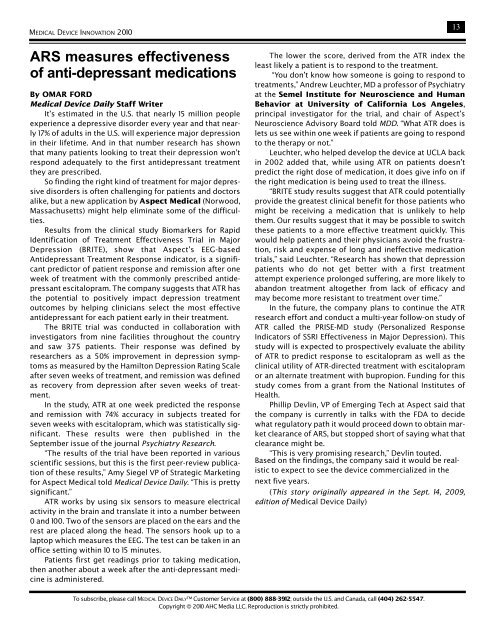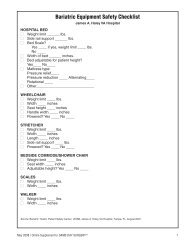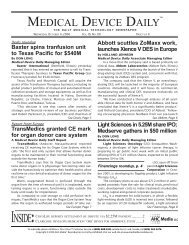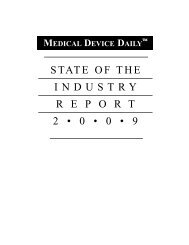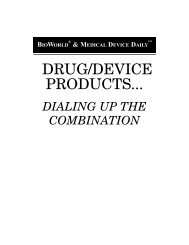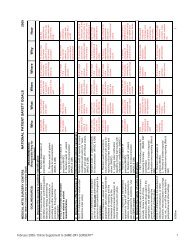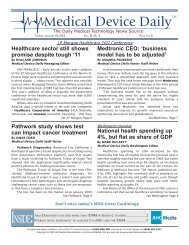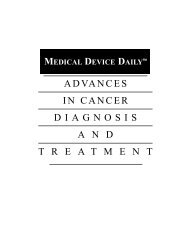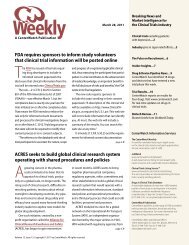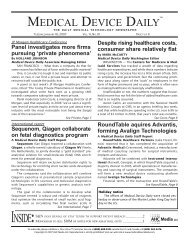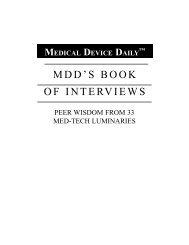MEDICAL DEVICE INNOVATION - Medical Device Daily
MEDICAL DEVICE INNOVATION - Medical Device Daily
MEDICAL DEVICE INNOVATION - Medical Device Daily
You also want an ePaper? Increase the reach of your titles
YUMPU automatically turns print PDFs into web optimized ePapers that Google loves.
<strong>MEDICAL</strong> <strong>DEVICE</strong> <strong>INNOVATION</strong> 2010<br />
ARS measures effectiveness<br />
of anti-depressant medications<br />
By OMAR FORD<br />
<strong>Medical</strong> <strong>Device</strong> <strong>Daily</strong> Staff Writer<br />
It’s estimated in the U.S. that nearly 15 million people<br />
experience a depressive disorder every year and that nearly<br />
17% of adults in the U.S. will experience major depression<br />
in their lifetime. And in that number research has shown<br />
that many patients looking to treat their depression won’t<br />
respond adequately to the first antidepressant treatment<br />
they are prescribed.<br />
So finding the right kind of treatment for major depressive<br />
disorders is often challenging for patients and doctors<br />
alike, but a new application by Aspect <strong>Medical</strong> (Norwood,<br />
Massachusetts) might help eliminate some of the difficulties.<br />
Results from the clinical study Biomarkers for Rapid<br />
Identification of Treatment Effectiveness Trial in Major<br />
Depression (BRITE), show that Aspect’s EEG-based<br />
Antidepressant Treatment Response indicator, is a significant<br />
predictor of patient response and remission after one<br />
week of treatment with the commonly prescribed antidepressant<br />
escitalopram. The company suggests that ATR has<br />
the potential to positively impact depression treatment<br />
outcomes by helping clinicians select the most effective<br />
antidepressant for each patient early in their treatment.<br />
The BRITE trial was conducted in collaboration with<br />
investigators from nine facilities throughout the country<br />
and saw 375 patients. Their response was defined by<br />
researchers as a 50% improvement in depression symptoms<br />
as measured by the Hamilton Depression Rating Scale<br />
after seven weeks of treatment, and remission was defined<br />
as recovery from depression after seven weeks of treatment.<br />
In the study, ATR at one week predicted the response<br />
and remission with 74% accuracy in subjects treated for<br />
seven weeks with escitalopram, which was statistically significant.<br />
These results were then published in the<br />
September issue of the journal Psychiatry Research.<br />
“The results of the trial have been reported in various<br />
scientific sessions, but this is the first peer-review publication<br />
of these results,” Amy Siegel VP of Strategic Marketing<br />
for Aspect <strong>Medical</strong> told <strong>Medical</strong> <strong>Device</strong> <strong>Daily</strong>. “This is pretty<br />
significant.”<br />
ATR works by using six sensors to measure electrical<br />
activity in the brain and translate it into a number between<br />
0 and 100. Two of the sensors are placed on the ears and the<br />
rest are placed along the head. The sensors hook up to a<br />
laptop which measures the EEG. The test can be taken in an<br />
office setting within 10 to 15 minutes.<br />
Patients first get readings prior to taking medication,<br />
then another about a week after the anti-depressant medicine<br />
is administered.<br />
The lower the score, derived from the ATR index the<br />
least likely a patient is to respond to the treatment.<br />
“You don’t know how someone is going to respond to<br />
treatments,” Andrew Leuchter, MD a professor of Psychiatry<br />
at the Semel Institute for Neuroscience and Human<br />
Behavior at University of California Los Angeles,<br />
principal investigator for the trial, and chair of Aspect’s<br />
Neuroscience Advisory Board told MDD. “What ATR does is<br />
lets us see within one week if patients are going to respond<br />
to the therapy or not.”<br />
Leuchter, who helped develop the device at UCLA back<br />
in 2002 added that, while using ATR on patients doesn’t<br />
predict the right dose of medication, it does give info on if<br />
the right medication is being used to treat the illness.<br />
“BRITE study results suggest that ATR could potentially<br />
provide the greatest clinical benefit for those patients who<br />
might be receiving a medication that is unlikely to help<br />
them. Our results suggest that it may be possible to switch<br />
these patients to a more effective treatment quickly. This<br />
would help patients and their physicians avoid the frustration,<br />
risk and expense of long and ineffective medication<br />
trials,” said Leuchter. “Research has shown that depression<br />
patients who do not get better with a first treatment<br />
attempt experience prolonged suffering, are more likely to<br />
abandon treatment altogether from lack of efficacy and<br />
may become more resistant to treatment over time.”<br />
In the future, the company plans to continue the ATR<br />
research effort and conduct a multi-year follow-on study of<br />
ATR called the PRISE-MD study (Personalized Response<br />
Indicators of SSRI Effectiveness in Major Depression). This<br />
study will is expected to prospectively evaluate the ability<br />
of ATR to predict response to escitalopram as well as the<br />
clinical utility of ATR-directed treatment with escitalopram<br />
or an alternate treatment with bupropion. Funding for this<br />
study comes from a grant from the National Institutes of<br />
Health.<br />
Phillip Devlin, VP of Emerging Tech at Aspect said that<br />
the company is currently in talks with the FDA to decide<br />
what regulatory path it would proceed down to obtain market<br />
clearance of ARS, but stopped short of saying what that<br />
clearance might be.<br />
“This is very promising research,” Devlin touted.<br />
Based on the findings, the company said it would be realistic<br />
to expect to see the device commercialized in the<br />
next five years.<br />
(This story originally appeared in the Sept. 14, 2009,<br />
edition of <strong>Medical</strong> <strong>Device</strong> <strong>Daily</strong>)<br />
13<br />
To subscribe, please call <strong>MEDICAL</strong> <strong>DEVICE</strong> DAILY Customer Service at (800) 888-3912; outside the U.S. and Canada, call (404) 262-5547.<br />
Copyright © 2010 AHC Media LLC. Reproduction is strictly prohibited.


